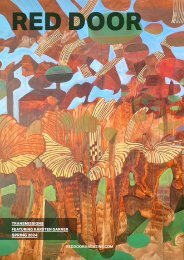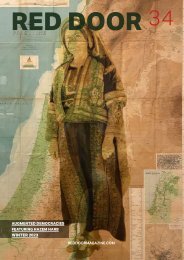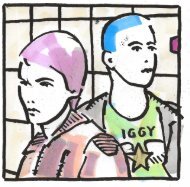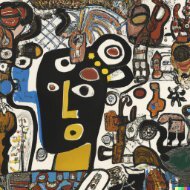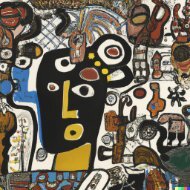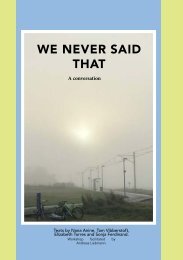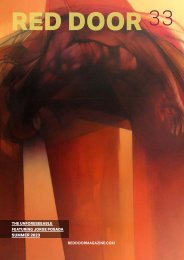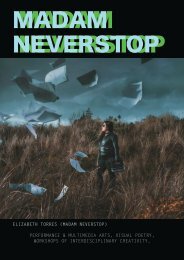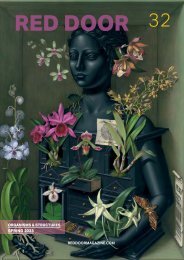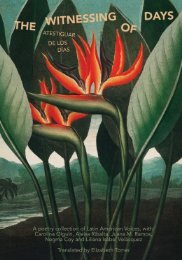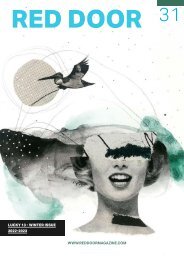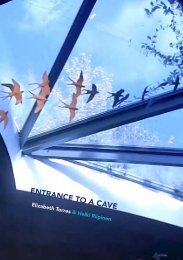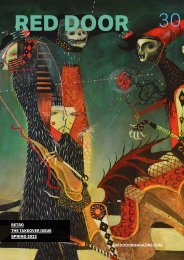PINK PAVILION 2022
Learn more at www.grob.dk
Learn more at www.grob.dk
You also want an ePaper? Increase the reach of your titles
YUMPU automatically turns print PDFs into web optimized ePapers that Google loves.
TEATER GROB PRESENTS<br />
<strong>PINK</strong> <strong>PAVILION</strong><br />
FESTIVAL<br />
8.-10. JUNI <strong>2022</strong>
Red Press, Copenhagen, <strong>2022</strong><br />
Illustrations by Madam Neverstop.<br />
ISBN: 978-87-94003-10-0<br />
All rights reserved by Teater Grob.<br />
www.grob.dk<br />
2
editorial<br />
JESPER PEDERSEN<br />
CURATOR & DRAMATURG<br />
Welcome to<br />
Pink Pavilion <strong>2022</strong><br />
This year the writers<br />
are from Finland, Haiti/<br />
France, Israel/Germany<br />
and Denmark. All the<br />
written texts examine<br />
how generations affect<br />
each other and ask what<br />
we are going to give<br />
each other moving<br />
forward.<br />
This is new dramatic<br />
texts that ask what kind<br />
of values and systems<br />
we want to pass on to<br />
the generations ahead.<br />
We hope that the<br />
line-up will make you<br />
laugh, listen. We hope<br />
it will surprise you,<br />
provoke you,<br />
inspire you or at<br />
least give you<br />
some food for<br />
thought.<br />
Have a great festival.<br />
3
Why should I<br />
care about future<br />
generations,<br />
what have<br />
they ever<br />
done for me?<br />
- Groucho Marx<br />
4
5
GAPING HOLE<br />
BY SALLA VIIKKA<br />
Finnish playwright and graduate from<br />
the Theater Academy of Finland,<br />
Salla Viikka’s work is centered on<br />
the themes of generational conflicts,<br />
identity, boredom and breaking the<br />
routine of daily life.<br />
She shares that she was always<br />
interested in storytelling, starting by<br />
drawing and making comics, and later<br />
moving on to sharing stories, moved<br />
by the response of her audiences.<br />
As influences Salla mentions that<br />
animation movies, comics, Disney<br />
cartoons and classic animation were<br />
very influential in her early years due<br />
to their slow rhythm, and later sci-fi and<br />
fantasy due to the extraordinary having<br />
room in ordinary situations.<br />
This is a big theme in Gaping Hole,<br />
where the boredom of ordinary life is<br />
suddenly disrupted. “When I came to<br />
the theater, after being a designer, I<br />
thought theater was boring because<br />
it was based on the classical and<br />
ordinary. But in my writing for theater<br />
I discovered the surprise element,<br />
you cannot show different planets<br />
so it gives room to the imagination.”<br />
When asked about Gaping Hole’s<br />
reason and purpose, Salla explains<br />
that a play for three characters was<br />
one of the goals that started the<br />
process, minimalizing a production<br />
and focusing on It won best Finnish<br />
play in 2015 and is now presented as<br />
part of Pink Pavilion festival. “An older<br />
woman, bitter about the way her life<br />
has turned out, using her whole life<br />
in preserving the memory of a great<br />
poet at the National Archive, finds<br />
herself in competition with this new<br />
intern in her early 20s disrupting the<br />
peace, thinking maybe she can make<br />
a doctorate about this poet... there’s<br />
also a male character who is the boss,<br />
maybe unable to see the difficulties this<br />
woman has in this situation. She gets to<br />
do passive-aggressive stuff to regain<br />
territory, a fight over some really small<br />
things, and it turns out very sci-fi, very<br />
absurd, because a hole appears that<br />
transports them to another universe”.<br />
Playwright: Salla Viikka (FI)<br />
Director: Helle Rossing<br />
Performers: Tina Gylling Mortensen,<br />
Maria Cordsen & Ernesto Piga Carbone<br />
Translator: Birgita Bonde Hansen<br />
6
PHOTO : ANU NIEMINEN<br />
7
WOUNDS ARE<br />
FOREVER<br />
(Self-portrait as National Poet)<br />
BY SIVAN BEN YISHAI<br />
“National poet of whom, exactly?” Sivan asks. “The title<br />
hints to this discourse of the Israeli, Palestinian, German<br />
Bermuda triangle, where many valuable, important<br />
discourses are sinking and disappearing. National poet<br />
of whom, exactly?” she repeats. “In English you have no<br />
name nor word for the place where one was born, holding<br />
all the emotional aspects of what it means to have been<br />
born in one place.”<br />
PHOTO: CHRISTIAN KLEINER<br />
Originally from Tel-Aviv and currently residing in Germany,<br />
Theater Director and Playwright Sivan Ben Yishai has a<br />
transnational story and a desire to find “the genome of<br />
questions” through her writing. Originally focusing on<br />
directing, it was a connection with writing once she allowed<br />
her voice to manifest itself, becoming a prolific writer soon<br />
after. Her plays have been shown at the Deutsches Theater<br />
Berlin, Maxim Gorki Theater Berlin and Theater Lübeck,<br />
among others. A fragment of Wounds Are Forever is<br />
presented as part of Pink Pavilion Festival.<br />
“In this play, I have a protagonist whom I call after my own<br />
name, Sivan Ben Yishai, and she calls in her, as we do,<br />
immigrants... holding several discourses in a way that could<br />
throw a very interesting light into political and national<br />
discourses that we are witnessing all the time, without<br />
being intellectually exhausting. Being an immigrant is to<br />
have all these perspectives and identities clashing and<br />
colliding withing ourselves.”<br />
Playwright: Sivan Ben Yishai (TY/ISR)<br />
Director: Helle Rossing<br />
Performers: Lila Nobel, Tina Gylling Mort<br />
Maria Cordsen & Ernesto Piga Carbone<br />
Translator: Mathias Raaby Ravn<br />
8
ensen,<br />
Wounds are forever is a play that attempts to share these<br />
fragments, these unions of parallel identities, touching<br />
deeply on the subjects of shame, as a ride or meditation<br />
on the 20th century from a Jewish, West-European<br />
Perspective, leaning on huge, vast events of history and<br />
jumping through time with this protagonist while switching<br />
identities and roles to belong, to save memories and be<br />
saved, holding all these pictures of histories in her body to<br />
become ageless, positionless, an empty category, a map.<br />
With this play, Sivan Ben Yishai explains that she wants to<br />
check how history imprints us, how we are responsible for<br />
the places we left behind, the discourses we left behind,<br />
and what reminds behind in our body as active ingredients<br />
that keep on working in us and designing and shaping the<br />
stories we tell.<br />
9
THE BLOOD PACT<br />
BY NIELS HENNING KRAG JENSBY<br />
Niels Henning Krag Jensby is based<br />
in Denmark, where he earned national<br />
attention during the debut of his novel<br />
Techno, released by Gyldendal in 2016,<br />
and which later became a play. He explains<br />
that he centers on the subjects of the gaysphere<br />
and culture, and the connections<br />
of the dynamics of violence, internally and<br />
externally, physically and mentally, which<br />
is created from not fitting into the majority<br />
narratives, due to older generations’<br />
trauma, creating negative cycles which<br />
people are forced to process in order to<br />
define their own identities.<br />
A Danish novelist and playwright, Niels<br />
Henning started a blog in the early ‘10s and<br />
soon after joined the Academy of Creative<br />
Writing, which allowed him to submerge<br />
himself in literature, fundamentally<br />
changing him and his perception with the<br />
world.<br />
PHOTO: JOAKIM ALMROTH<br />
10
“When you write literature you sit and think<br />
and think, and theater is more about doing,<br />
which I found like a good challenge” he<br />
explains, when talking about writing this<br />
play. “It’s a huge contrast but you also<br />
have to think about the physical space,<br />
the bodies, the people you have to write<br />
instructions to, and this at the end becomes<br />
art... what I find the most different is not the<br />
final product, but an instruction manual to<br />
how to make the final product”.<br />
“I wanted to write about an important<br />
author in post-war Japan who committed<br />
seppuku, he had a private army of young<br />
men and he tried to make a coup and<br />
failed, so him and his best in command<br />
also commited suicide. His character is<br />
complex and problematic because he<br />
was a nationalist, a fascist, but also a gay<br />
man, a closeted gay man. I didn’t want<br />
to idolize him nor his final act... So rather<br />
than writing about him, I wrote about his<br />
next-in-command, his journey and<br />
fictionalized love story, which had wild<br />
consequences. We meet him as he visits<br />
the gravesite of his parents the day before<br />
they’re supposed to commit this coup.”<br />
Playwright: Niels Henning Krag Jensby (DA)<br />
Director: Sargun Oshana<br />
Performer: Lasse Steen Jensen<br />
11
OPÉRA POUSSIÉRE<br />
BY JEAN D’AMERIQUE<br />
“I am the testimony of the power of poetry” says<br />
poet, novelist and playwright Jean D’Amerique,<br />
speaking from Port-au-Prince, when asked about the<br />
effect of writing in his life. The poet resides in Paris,<br />
Brussels and Haiti, where he was born. “I started<br />
listening to Hip-Hop when I was 12, fascinated by<br />
this music which is poetry, and which gave me the<br />
motivation to write because it was by young people<br />
from neighborhoods like mine, rejecting society and<br />
making poetry look like power, a way to have a voice<br />
in this world. I quickly after made a lot of poetry and<br />
books, and continued to follow this path to the point<br />
where poetry is now essential in my life.”<br />
Jean D’Amerique grew up in a country where social<br />
and political violence were frequent, something<br />
which greatly influenced the subjects of his writing.<br />
“I didn’t need to look for subjects anywhere else,<br />
I write about what concerns my life and the lives<br />
of those who live around me. The poetry is from<br />
my hood, from my bone and flesh, because I need<br />
to talk about those who are rejected in society, to<br />
give a voice to those don’t have one”. His latest<br />
book, Atelier du silence, recently was awarded the<br />
Heather-Dohoullau Price this <strong>2022</strong>.<br />
12
Playwright: Jean d’Amerique (FR/HAI)<br />
Director: Nina Rudawski<br />
Performers: Lila Nobel & Lasse Steen Jensen<br />
Translator: Lone Garde<br />
Speaking on the play presented at this festival, he<br />
explains that he based it on “a Haitian woman who<br />
was a fighter, a revolutionary against colonialism<br />
in Haiti, so I didn’t know that it could be relevant<br />
for Copenhagen, but ok, it’s not just about Haitian<br />
history, she’s an example for the world, by fighting<br />
a specific violence when we were occupied by<br />
France, but we didn’t learn about her life in school,<br />
so I was really fascinated by her story once I started<br />
researching her... so I wanted to take her from the<br />
dust and share her story. Give her some light. She<br />
comes back to life, a sort of ghost, asking us to give<br />
her the place she deserves, even launching a social<br />
media campaign to tell the world: I am here”.<br />
PHOTO: JOAKIM ALMROTH<br />
13
<strong>PINK</strong> <strong>PAVILION</strong><br />
2021<br />
14
15
<strong>PINK</strong> <strong>PAVILION</strong><br />
<strong>2022</strong><br />
PHOTO: BIRK THOMASSEN<br />
16
CURATION: INTERGENERATIONAL SOLIDARITY<br />
<strong>PINK</strong> <strong>PAVILION</strong> <strong>2022</strong><br />
will present new writing<br />
that provides a new<br />
perspective on the topic<br />
of sustainability, which we<br />
call intergenerational<br />
solidarity.<br />
Never before has there<br />
been a time in history<br />
where our actions and<br />
decisions had such<br />
monumental<br />
consequences for future<br />
societies as they do<br />
now. We aim to present<br />
new writing that asks<br />
What ideas do we wish to<br />
pass on to these coming<br />
generations? What values<br />
do we want to dismantle<br />
here and now, in order<br />
to cease their negative<br />
impact in the future?<br />
Our hope is that<br />
by presenting a rich and<br />
diverse program<br />
of artists and genres<br />
under the banner<br />
of intergenerational<br />
solidarity and<br />
sustainability,<br />
perhaps we can<br />
see the beginning of<br />
a new aesthetics and<br />
ethics in theatre,<br />
whichpurposely touches<br />
emotional fibers<br />
in the audience, creating<br />
connections between<br />
the well being of present<br />
generations and the<br />
reflections in the ones to<br />
come.<br />
17
18
All the interviews collected on this booklet<br />
are contained as full episodes of the Red<br />
Transmissions Podcast as a collaboration<br />
with Teater Grob. Listen to them on most podcast<br />
providers or visit www.redtransmissions.libsyn.com<br />
19
For more information go to www.grob.dk




